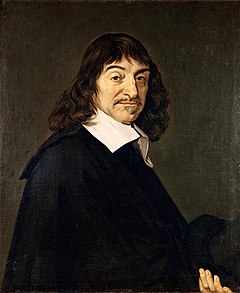Scientist, mathematician, traveller, soldier, and spy – Rene Descartes (http://en.wikipedia.org/wiki/Descartes) has been called the ‘Father of Modern Philosophy’. Born in 1596 into an era still dominated by the medieval world view, he was one of the chief actors in the riveting intellectual drama that ushered in the modern world. His life coincided with an extraordinarily significant time in history – the first half of the miraculous seventeenth century, replete with genius in the arts and sciences, and wracked by civil and international conflicts across Europe. Before his death in 1650 Descartes made immense contributions to an exceptionally wide range of disciplines, and his assertion ‘Cogito, ergo sum’ (‘I think, therefore I am’) has become one of the most famous maxims in all philosophy. He was the very archetype of a ‘Renaissance man’.
The book that best gave me a handle on what Descartes was arguing was Descartes: The Project of Pure Enquiry (1978) by Bernard Williams (http://en.wikipedia.org/wiki/Bernard_Williams). The author analyses Descartes’ project of founding knowledge on certainty. He then uncovers the philosophical motives for his search. He demonstrates how Descartes’ Meditations are not merely a description but the very enactment of philosophical thought and discovery. Williams covers all of the key areas of Descartes’ thought, including God, the will, the possibility of knowledge, and the mind and its place in nature. He also makes profound contributions to the theory of knowledge, metaphysics and philosophy generally. This is essential reading for any student of philosophy. Enquire at your local library or available at http://www.amazon.co.uk/Descartes-The-Project-Pure-Enquiry/dp/041535627X/ref=tmm_pap_title_0?ie=UTF8&qid=1419252828&sr=8-1
Go on to read Descartes: The Life of René Descartes and Its Place in His Times (2005) by Anthony Grayling. This is less austerely philosophical and sets the mind and work of Descartes beautifully in its historical context. Enquire at your local library or available at http://www.amazon.co.uk/Descartes-Life-Ren%C3%A9-Place-Times/dp/1416522638/ref=sr_1_1?ie=UTF8&qid=1419253360&sr=8-1&keywords=grayling+descartes
If pressed for time, reach for Descartes: A Very Short Introduction (2000) by Tom Sorrell. Enquire at your local library or available at http://www.amazon.co.uk/Descartes-Very-Short-Introduction-Introductions/dp/0192854097/ref=sr_1_1?ie=UTF8&qid=1419254280&sr=8-1&keywords=short+introduction+descartes
Another reliable primer, on account of the clarity of the author’s prose, is Descartes: A Study of His Philosophy (1968) by Anthony Kenny. Enquire at your local library or available at http://www.amazon.co.uk/Descartes-Study-His-Philosophy-Texts/dp/1890318132/ref=sr_1_1?s=books&ie=UTF8&qid=1419254682&sr=1-1&keywords=kenny+descartes
Into your stride now and hungering for the meaty stuff, order up Cottingham, John (1992). The Cambridge Companion to Descartes. Cambridge: Cambridge University Press. ISBN 0-521-36696-8. Enquire at your local library or available at http://www.amazon.co.uk/Cambridge-Companion-Descartes-Companions-Philosophy/dp/0521366968/ref=sr_1_3?s=books&ie=UTF8&qid=1419270197&sr=1-3&keywords=cambridge+companion+descartes
For a lifetime of thought on the problems over which Descartes grappled follow the bibliographies at The Stanford Encyclopedia at the link http://plato.stanford.edu/entries/descartes/
For 45 minutes of pure listening enchantment go to the BBC Radio 4 ‘In Our Time’ episode on ‘Cogito Ergo Sum’. Available from the link http://www.bbc.co.uk/programmes/b010mvcp With Susan James – Professor of Philosophy at Birkbeck College, London; John Cottingham – Professor Emeritus of Philosophy at Reading and Professorial Research Fellow at Heythrop College, University of London; Stephen Mulhall – Professor of Philosophy at Oxford. Chaired by Melvyn Bragg. First broadcast Thursday 28 Apr 2011.
328 pages in Routledge paperback edition
First published 1978
ISBN 978-0415356275
Bernard Williams Rene Descartes



